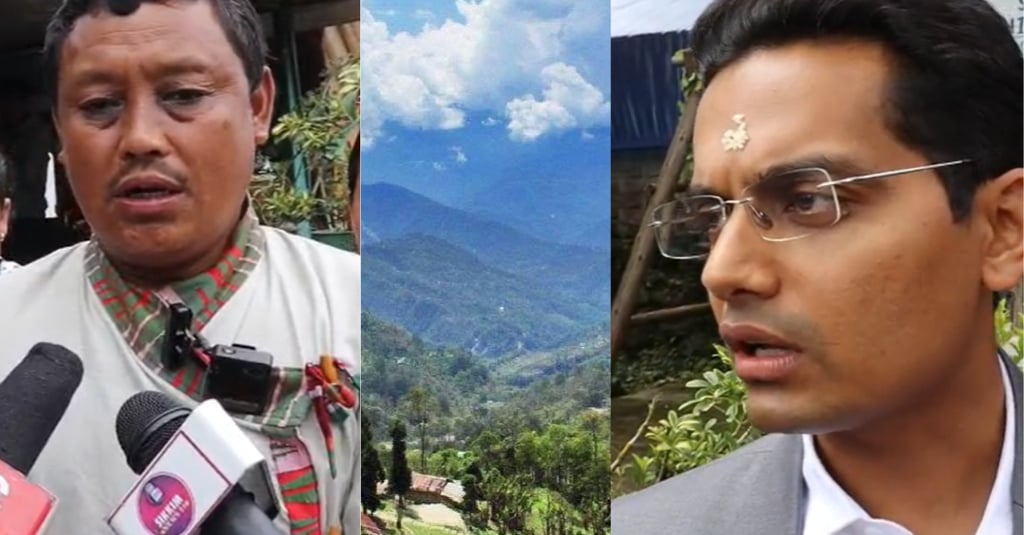We have created India’s first digital nomad village to ensure year-round income for locals, says DC Rohan Ramesh
He also mentioned the fragmented nature of the village, stretching from the market area uphill, with families living far apart.
LOCAL


The peaceful village of Yakten in Sikkim has been officially declared India’s first Digital Nomad Village. The ambitious initiative, called Nomad Sikkim, was launched by the District Administrative Centre, Pakyong, under the leadership of District Collector Agawane Rohan Ramesh, IAS. The project aims to create a sustainable, year-round livelihood model for homestay owners by attracting remote workers and digital nomads from across India and beyond.
Speaking about the project, DC Rohan Ramesh said, “This initiative is inspired by the Hon’ble Chief Minister’s vision of ‘One Family, One Entrepreneur’. Our homestay owners usually earn revenue for just four to five months a year during tourist seasons. The rest of the year, their income remains stagnant. Nomad Sikkim is a way to bridge this seasonal gap and ensure steady income throughout the year.”
The digital nomad model works on the simple principle that remote workers, freelancers, and online professionals can work from anywhere, as long as they have reliable internet and a comfortable place to stay. “For such people, seasons or timing don’t matter,” said the Collector. “If we can provide a good working environment, people will come, and locals will benefit.”
To make the project viable, basic infrastructure was put in place swiftly. The district administration tackled the issue of internet connectivity by installing two internet lines and setting up Wi-Fi throughout the area. Each homestay is now equipped with inverters to ensure uninterrupted electricity even during outages—crucial for remote work. “Internet and electricity are basic needs, and we have ensured both are stable,” Rohan Ramesh added.
The administration also addressed a major concern in the village—drinking water. “Under the Jal Jeevan Mission, there is already a proposal for this village. But since that may take time, we have provided a temporary solution to ensure villagers and guests do not suffer,” he said.
Another key aspect of the Nomad Sikkim initiative is environmental sustainability. The administration has roped in experts to conduct a waste audit, identifying types of waste being generated and steps needed to manage it. “We want to make Yakten a zero-waste village. We are committed to this goal,” said the DC.
But while the administration brings hope and vision, the story of the people of Yakten reflects both resilience and years of quiet struggle.
Gyan Bahadur Subba, President of the Yakten Village Tourism Cooperative Society, shared the practical journey of the homestay owners. “We have been working on this since 2015, following the ideas of our former District Collector. For ten years, we’ve faced challenges and made several appeals to the administration. And now, finally, we see a new beginning.”
Subba spoke of how villagers renovated their rooms without financial aid, using personal savings and loans of around two lakhs per room. “They told us to do it ourselves. So we took loans and renovated. But now, we are still repaying those debts. We are hopeful the promise of regular tourists—during peak and off-season—will be fulfilled.”
The issue of water remains deeply concerning for locals. “Due to airport construction, our main water source has gone lower underground,” said Subba. “Though pipelines are being laid under the support of our Panchayat and Ramesh Gurung ji, we still don’t know whether water will actually reach us.”
He also mentioned the fragmented nature of the village, stretching from the market area uphill, with families living far apart. “Despite these challenges, we are trying to stay united. But for long-term sustainability, we need full government support.”
He recalled earlier promises made by officials that those involved in running the tourism efforts would be allotted homestays. “None of those promises have been kept. We feel disappointed,” he said. Subba estimated that an additional ₹40–45 lakhs would be needed to fully develop Yakten into a model digital nomad destination. “But who will bear that cost?” he asked.
Still, despite the challenges, there is a sense of cautious optimism in Yakten. The MLA’s recent visit brought hope, as villagers shared their concerns directly. The homestay owners are now relying on government support and consistent guidance to ensure that this one-of-a-kind project does not remain just a dream on paper.
